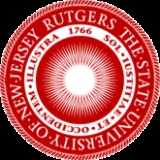
Rutgers-Newark
Encyclopedia
- This article discusses Rutgers University's campus in Newark, New Jersey. For general information on the University as a whole, please see Rutgers UniversityRutgers UniversityRutgers, The State University of New Jersey , is the largest institution for higher education in New Jersey, United States. It was originally chartered as Queen's College in 1766. It is the eighth-oldest college in the United States and one of the nine Colonial colleges founded before the American...
. For other uses of "Rutgers", please see Rutgers (disambiguation)Rutgers (disambiguation)The name Rutgers may refer to the following people and institutions.-People:*Henry Rutgers , Colonel in the American Revolution, and benefactor of Rutgers University* Arend Joan Rutgers , a Dutch-Belgian physical chemist...
.
Rutgers University in Newark is one of three campuses of Rutgers, The State University of New Jersey, the eighth oldest college in the United States and a member of the Association of American Universities
Association of American Universities
The Association of American Universities is an organization of leading research universities devoted to maintaining a strong system of academic research and education...
. It is located in Newark, New Jersey
Newark, New Jersey
Newark is the largest city in the American state of New Jersey, and the seat of Essex County. As of the 2010 United States Census, Newark had a population of 277,140, maintaining its status as the largest municipality in New Jersey. It is the 68th largest city in the U.S...
.
History
Rutgers University, Newark, officially came into existence in 1946, when the New Jersey State Legislature voted to make the University of Newark part of Rutgers University. The roots of Rutgers University, Newark, however, date back to 1908 when the New Jersey Law School first opened its doors. That law school, along with four other educational institutions in Newark — Dana College, the Newark Institute of Arts & Sciences, the Seth BoydenSeth Boyden
Seth Boyden was an American inventor. He was the brother of Uriah A. Boyden.A New England native , he was a watchmaker who moved to Newark, New Jersey. Boyden perfected the process for making patent leather, created malleable iron, invented a nail-making machine, and built his own steamboat...
School of Business, and the Mercer Beasley School of Law — formed a series of alliances over the years. A final merger in 1936 resulted in the establishment of the University of Newark. A decade later, Rutgers University in Newark was founded.
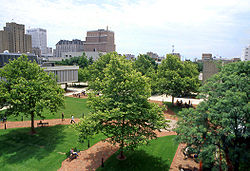
University Heights, Newark, New Jersey
thumb|left|200pxUniversity Heights is a neighborhood in Newark, New Jersey, so named because of the location of four academic institutions within its boundaries — Rutgers University , the New Jersey Institute of Technology, the University of Medicine and Dentistry of New Jersey , and Essex County...
neighborhood, consists of the following degree-granting divisions:
- Newark College of Arts and Sciences
- The Newark College of Arts and Sciences enrolls more than 60 percent of the undergraduates at Rutgers University in Newark and is the largest school on campus. With majors in almost 40 fields, the curricula at NCAS combine the advantages of a liberal arts foundation with the specialized training necessary for a specific career. Degrees awarded include bachelor of arts, bachelor of fine arts and bachelor of science.
- University College—Newark
- University College—Newark is designed for adult students who have obligations during the day and attend class in the evening or on Saturday. Degrees awarded include bachelor of arts and bachelor of science.
- Graduate School—Newark
- The Graduate School—Newark is dedicated to the advancement of scientific and human knowledge in an environment that encourages scholarly inquiry and intellectual growth. Graduate students are expected to develop the analytical and creative skills required for original scholarship, research, and problem solving, as well as a thorough understanding of an academic discipline. Degrees awarded include master of arts, master of science, master of fine arts in creative writing, and doctor of philosophy in a range of disciplines.
- Rutgers University School of Public Affairs and AdministrationRutgers University School of Public Affairs and AdministrationThe School of Public Affairs and Administration at Rutgers-Newark was founded in 2006 after providing doctoral and master’s public administration education for over 30 years to pre-service, in-service, and executive students through the Rutgers-Newark Graduate School.Guided by the principles of...
- The School of Public Affairs and Administration is dedicated to four goals: competence, diversity, knowledge, and service. The Master of Public Administration program is rated highly by U.S. News & World Report, ranking 10th in the nation in public management administration and 32nd in the broader category of public affairs. Degrees awarded include masters in public administration, executive masters in public administration, and doctorate in public administration.
- College of Nursing
- Formed in 1956, the College of Nursing is accredited by the Commission on Collegiate Nursing Education. It offers an RN-BS program, a Master of Science degree offering clinical expertise for advanced practice nursing and the only Ph.D. program in nursing in New Jersey. Degrees awarded include bachelor of science, master of science, doctorate in nursing practice (DNP), and doctor of philosophy.
- Rutgers Business School -- Newark and New BrunswickRutgers Business SchoolRutgers Business School is the graduate and undergraduate business school tied to the Newark and New Brunswick campuses of Rutgers University. It was founded in 1929.Rutgers Business School offers bachelor, masters, and Ph.D. degrees...
- Founded in 1929, the business school offers extensive undergraduate and graduate business programs on the Newark and New Brunswick campuses of Rutgers. It is accredited by The Association to Advance Collegiate Schools of Business International and has received high rankings by U.S. News & World Report, Business Week and The Wall Street Journal. Degrees awarded include bachelor of science, master of business administration, executive master of business administration, international executive master of business administration, and doctorate in management.
- School of Criminal Justice
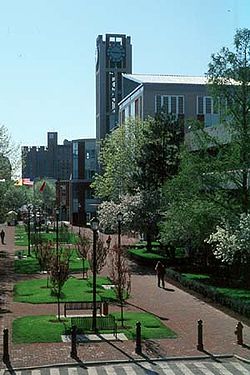
- The School of Criminal Justice is a major national and international center for scholarly research on all aspects of policing, delinquency, crime, and criminal justice administration. The school also provides educational programs that fulfill public service obligations by helping to address the needs of criminal justice agencies within the city, state, nation, and world. Degrees awarded include bachelor of science, master of science, joint bachelor of science and master of science, and doctorate in criminal justice.
- Rutgers School of Law -- Newark
- The Rutgers School of Law—Newark, the oldest law school in New Jersey, has a deeply rooted tradition of commitment to three defining elements: teaching, scholarship, and service. Through the law school's eight clinics and pro bono activities, faculty and students are at the forefront of resolving the complex legal issues facing a global society. Prominent graduates include United States senators and congressmen, New Jersey Supreme Court justices, and leaders in the fields of law, business, and the public sector. Degrees awarded include juris doctor and various masters degrees offered jointly with a juris doctor.
Rutgers University in Newark awards approximately 60 doctoral degrees, 1,000 graduate degrees, and 1,200 baccalaureate degrees each year and was ranked 12th in the nation for quality among small research universities by the 2005 Faculty Scholarly Productivity Index. U.S. News & World Report "Best Colleges" has named Rutgers University, Newark, the most diverse national university in the United States since 1997.
Majors and minors offered at Rutgers University in Newark include: African-American and African studies, allied health technologies, American studies, Ancient Mediterranean civilizations, anthropology, art, biological sciences, botany, Central and Eastern European studies, chemistry, clinical laboratory sciences, computer science, economics, education (teacher certification), English, environmental sciences, French, geology, geoscience engineering, graphic design (bachelor of fine arts), history, information systems, journalism and media studies, mathematics, mathematics (applied), music, philosophy, physics, political science, Portuguese and Lusophone world studies, psychology, social work, sociology, Spanish, theater, television and media arts, visual arts (bachelor of fine arts), women's studies, and zoology.
Organization/governance/leadership
Richard L. McCormick is president of Rutgers University, which has campuses located in New Brunswick and Piscataway, Newark and Camden. Steven J. Diner is chancellor of Rutgers University in Newark. As chief executive of the Newark campus since July 2002, Chancellor Diner leads an institution consisting of seven schools, more than 11,000 students, 500 full-time faculty and 1,100 full-time staff, with a budget of $130,000,000.The deans of each school are:
- Glenn Shafer, interim dean, Rutgers Business School – Newark and New Brunswick
- John J. Farmer, Jr., dean, Rutgers School of Law – Newark
- Marc Holzer, dean, School of Public Affairs and Administration
- William L. Holzemer, dean, College of Nursing
- Gary Roth, dean, Graduate School – Newark
- Todd Clear, dean, School of Criminal Justice
- Philip Yeagle, dean, Newark College of Arts and Sciences and University College – Newark
Enrollment
Rutgers University in Newark enrolls more than 11,500 students (more than 7,307 undergraduate, 4,193 graduate) in programs in the arts, humanities, sciences, criminal justice, business, public affairs and administration, law, and nursing. Since 1997, U.S. News & World Report "Best Colleges" has consistently ranked Rutgers University in Newark tops in student diversity.Admissions and financial aid
Undergraduate admissions to Rutgers University in Newark are classified as “selective” by U.S. News & World Report. Rutgers University in Newark receives almost 17,000 freshman and transfer applications and enrolls about 1,700 new students each year. Admissions decisions are based on academic potential as demonstrated by grades, grade-point average, class rank and test scores as well as extracurricular activities and demonstrated leadership such as volunteer work, school clubs and organizations, community service and paid employment. Merit scholarships are offered at the acceptance stage to students who demonstrate outstanding academic achievement.Tuition for full-time, New Jersey residents attending Rutgers University in Newark is $9,268; for non-residents it is $19,482. Fees are $2,294, and the cost of room and board is $9,942.
For the 2008-2009 academic year, 85 percent of the entering class received an offer of financial aid from Rutgers University in Newark. Using a student’s Free Application for Financial Student Aid, Rutgers develops a customized financial-aid package based on the student’s qualifications, financial need, and funds available to the university. A financial aid package may include any or a combination of these major financial aid sources: gift aid (e.g., grants, scholarships, and awards), loans, and work-study. Offers typically range from $500 to $24,000, with the average financial aid package reaching $17,500.
Diversity
U.S. News & World Report "Best Colleges" has consistently ranked Rutgers University in Newark number one in student diversity among national universities since 1997. Twenty-seven percent of full-time undergraduate students enrolled in the fall of 2008 were white, 25 percent Asian, 20 percent Latino, 18 percent African American, 8 percent multiracial, multi-ethnic or unknown, and 2 percent foreign. More than 70 nations are represented in the student body.Athletics
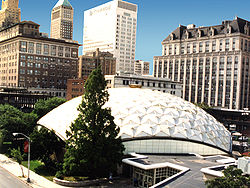
Rutgers Scarlet Knights
The Rutgers Scarlet Knights are the athletic teams that represent Rutgers, The State University of New Jersey...
. The Rutgers-Camden
Rutgers-Camden
Rutgers University in Camden, New Jersey, USA , is a state-funded, coeducational, public, research university. Founded in the 1920s, Rutgers–Camden began as an amalgam of the South Jersey Law School and the College of South Jersey. It is the southernmost of the three regional campuses of Rutgers,...
athletic teams are called the Scarlet Raptors. The Scarlet Raiders and the Scarlet Raptors both compete within NCAA Division III. The Scarlet Knights compete within Division I.)
The Rutgers–Newark Scarlet Raiders field teams for NCAA
National Collegiate Athletic Association
The National Collegiate Athletic Association is a semi-voluntary association of 1,281 institutions, conferences, organizations and individuals that organizes the athletic programs of many colleges and universities in the United States...
competition in 14 sports (7 each for men and women) — thirteen in Division III and one in Division I (men's volleyball
NCAA Men's Volleyball Championship
The NCAA Men's Volleyball Championship is the tournament that determines the national championship of American college volleyball.The "Final Four" is a term used exclusively by NCAA Basketball but is commonly used to describe the Men's Volleyball Championship...
). The Division III sports are: men's and women's basketball
College basketball
College basketball most often refers to the USA basketball competitive governance structure established by the National Collegiate Athletic Association . Basketball in the NCAA is divided into three divisions: Division I, Division II and Division III....
, men's and women's cross country
Cross country running
Cross country running is a sport in which people run a race on open-air courses over natural terrain. The course, typically long, may include surfaces of grass and earth, pass through woodlands and open country, and include hills, flat ground and sometimes gravel road...
, men's and women's soccer
College soccer
College soccer is a term used to describe association football played by teams who are operated by colleges and universities as opposed to a professional league operated for exclusively financial purposes...
, men's and women's tennis
Tennis
Tennis is a sport usually played between two players or between two teams of two players each . Each player uses a racket that is strung to strike a hollow rubber ball covered with felt over a net into the opponent's court. Tennis is an Olympic sport and is played at all levels of society at all...
, men's and women's track and field
Track and field
Track and field is a sport comprising various competitive athletic contests based around the activities of running, jumping and throwing. The name of the sport derives from the venue for the competitions: a stadium which features an oval running track surrounding a grassy area...
, volleyball (women)
NCAA Women's Volleyball Championship
The NCAA has contested team championships in women's volleyball since 1981. The following is a list of the champions of each division with their record for the year in which they won the championship, and the runner up, city, site and other final four participants for division I...
, baseball
College baseball
College baseball is baseball that is played on the intercollegiate level at institutions of higher education. Compared to football and basketball, college competition in the United States plays a less significant contribution to cultivating professional players, as the minor leagues primarily...
(men) and softball
College softball
College softball is softball as played on the intercollegiate level at institutions of higher education, predominantly in the United States. College softball is normally played by women at the intercollegiate level, whereas college baseball is normally played by men.As with other intercollegiate...
(women). The Scarlet Raiders are members of the New Jersey Athletic Conference
New Jersey Athletic Conference
The New Jersey Athletic Conference , formerly the New Jersey State Athletic Conference, is a college athletic conference affiliated with the NCAA's Division III. Full members are located in New Jersey, track-only and football-only members are located in Connecticut and New York.-Member...
(NJAC) and the Eastern Intercollegiate Volleyball Association
Eastern Intercollegiate Volleyball Association
The Eastern Intercollegiate Volleyball Association is a college athletic conference whose member schools compete in men's volleyball. Its member institutions are located in the Northeast United States....
.
Built in 1977, the Golden Dome Athletic Center is the hub of Rutgers–Newark athletics, seating 2,000. Soccer and softball games are held on Alumni Field, while the Rutgers–Newark baseball team plays at Bears & Eagles Riverfront Stadium
Bears & Eagles Riverfront Stadium
Bears & Eagles Riverfront Stadium is a 6,200-seat baseball park in Newark, New Jersey, USA, that hosted its first regular season baseball game on July 16,1999, with former 1940's bear Yogi Berra throwing the ceremonial first pitch, as the tenants of the facility, the Newark Bears, took on the...
, a 6,200-seat ballpark that is home to the Newark Bears
Newark Bears
The Newark Bears are an American professional baseball team based in Newark, New Jersey. They are a member of the Canadian American Association of Professional Baseball, which is not affiliated with Major League Baseball. Since the 1999 season, the Bears have played their home games at Bears &...
, a minor-league professional baseball franchise.
Rankings and statistics
- According to the 2009 “Best Graduate Schools” rankings released by U.S. News & World Report, the School of Public Affairs and Administration (SPAA) at Rutgers University in Newark has one of the top 10 graduate programs in the United States in the areas of information and technology management, and public management and administration. Specifically, SPAA holds high rankings in the following categories: information and technology management (9th), public management and administration (10th), public finance and budgeting (11th), city management and urban policy (14th), and non-profit management (18th).
- Rutgers School of Law – Newark is ranked as a “Tier 1” school by the 2009 edition of U.S. News & World Report’s “Best Graduate Schools.” It is tied for 80th overall.
- The 2007 edition of the “Best 170 Law Schools” by The Princeton Review ranks Rutgers School of Law – Newark as having the 10th most diverse faculty and being the third most welcoming to older students.
- U.S. News & World Report’s 2009 "Best Business Schools" rankings place Rutgers Business School – Newark and New Brunswick 59th nationwide.
- The Princeton Reviews 2009 edition of "Best 296 Business Schools" survey of business schools accredited by The Association to Advance Collegiate Schools of Business ranks Rutgers Business School – Newark and New Brunswick 6th nationwide for "Most Competitive Students."
- The Wall Street Journal’s 2007 "Top Business Schools" survey of corporate recruiters ranks the business school 39th nationally among regional business schools (i.e., schools that tend to draw many of their recruiters from their local regions).
- The Wall Street Journal ranks Rutgers 20th among the top 25 executive MBA programs worldwide.
- London’s Financial Times ranks Rutgers Business School – Newark and New Brunswick 3rd among executive MBA programs offered by public universities in the United States.
- U.S. News & World Report’s 2009 "Best Graduate Schools" rankings place Rutgers School of Criminal Justice 7th nationwide.
- Forbes magazine ranks Rutgers–Newark the most diverse campus in the United States for its rich mix of students from different racial and ethnic backgrounds.
- Washington Monthly magazine ranks Rutgers–Newark as the 18th best nation university in the country in 2010.
Faculty
There are more than 400 full-time faculty members at Rutgers University in Newark, 99 percent of whom hold doctor of philosophy or juris doctor degrees. Faculty on the Newark campus currently include a Pulitzer Prize recipient and members of the National Academy of Sciences, the Institute of Medicine of the National Academy of Sciences, the American Academy of Arts and Letters, the American Academy of Arts and Sciences, and the American Association for the Advancement of Science. A number of Rutgers University, Newark, faculty members have been awarded the prestigious Guggenheim Fellowship and named as Fulbright Fellows.Research
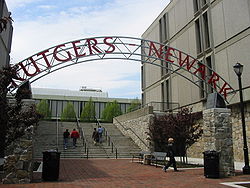
Select centers and institutes at Rutgers University in Newark:http://www.newark.rutgers.edu/research/index.php?usid=5&usName=Faculty
- Institute of Jazz Studies – founded 1952
- National Center for Public Performance – founded 1972
- New Jersey Small Business Development Center – founded 1977
- Center for Molecular and Behavioral Neuroscience – founded 1985
- Center for Information Management, Integration and Connectivity – founded 1995
- Division of Global Affairs – founded 1996
- Institute on Ethnicity, Culture and the Modern Experience – founded 1998
- Joseph C. Cornwall Center for Metropolitan Studies – founded 2000
- Institute on Education Law and Policy – founded 2000
- Center for Nonprofit and Philanthropic Leadership – founded 2004
- Center for Urban Entrepreneurship & Economic Development – founded 2008
- Newark Schools Research Collaborative – founded 2009
Community engagement
Throughout its 100-plus years of providing higher education in the city of Newark, Rutgers University in Newark has continually fostered deep connections to its home city and its surrounding communities. Through the plethora of business, civic and not-for-profit institutions that serve the people of Newark and northern New Jersey, the faculty, staff and students of Rutgers apply their skills and expertise while demonstrating their strong commitment to civic/community engagement. In that regard, in 2006, The Carnegie Foundation for the Advancement of TeachingThe Carnegie Foundation for the Advancement of Teaching
Founded by Andrew Carnegie in 1905 and chartered in 1906 by an act of the United States Congress, the Carnegie Foundation for the Advancement of Teaching is an independent policy and research center, whose primary activities of research and writing have resulted in published reports on every level...
selected Rutgers University in Newark as one of among a small pool of U.S. colleges and universities for the foundation’s Community Engagement Classification. Specifically, The Carnegie Foundation for the Advancement of Teaching placed Rutgers University in Newark in the foundation’s Outreach and Partnerships category, recognizing the university for its ability to apply and provide collaboratively institutional resources that benefit both campus and community. In 2010, the foundation expanded the university’s classification to include the category of Curricular Engagement for the school’s ability to foster a teaching, learning and scholarship environment that engages faculty, students and community in mutually beneficial and respectful collaboration.
Alumni
- Business
- Orville E. Beal – former president, The Prudential Insurance Company
- Felix M. Beck – retired chairman & chief executive officer, Margaretten & Co.
- Dennis M. Bone – president, Verizon New Jersey
- Raymond G. Chambers – philanthropist and humanitarian; chairman, MCJ Amelior Foundation
- Anthony Coscia – chairman, Port Authority of New York and New Jersey
- Albert R. Gamper – retired chairman & chief executive officer, CIT Group Inc.
- Ralph Izzo – president, chairman & chief executive officer, PSEG
- Maryann Keller – former president, Automotive Services, priceline.com
- Alfred C. Koeppe – president & chief executive officer, Newark Alliance; former president & chief operating officer, PSE&G
- Rosemary T. McFadden – former president & chief operating officer, New York Mercantile Exchange
- Law/Government
- Elizabeth Blume-Silverstein – one of New Jersey’s first female lawyers; co-founder of the World Jewish Congress
- Ronald K. Chen – former New Jersey Public Advocate
- Christopher J. Connors - New Jersey senator (R-9th District)
- Louis J. Freeh – former director, Federal Bureau of Investigation
- Nia Gill – New Jersey senator (D-34th District)
- Richard J. Hughes – former governor of New Jersey; chief justice of the New Jersey Supreme Court
- Irwin J. Kimmelman - former New Jersey Attorney General; retired judge of the New Jersey Superior Court
- Jaynee LaVecchia – justice of the New Jersey State Supreme Court
- Virginia Long – justice of the New Jersey State Supreme Court
- Robert Menendez – United States senator (D-NJ)
- Hazel O’Leary – president, Fisk University; former United States Secretary of Energy
- Ronald L. Rice – New Jersey senator (D-32nd District)
- Peter W. Rodino Jr. – former United States representative (D-NJ); former chair, House Judiciary Committee during Watergate presidential impeachement hearings
- Elizabeth Warren – Leo Gottlieb Professor of Law at Harvard Law School; in 2009 named one of Time Magazines “100 Most Influential People in the World”
- Culture
- Adriana Bosch – Emmy Award-winning filmmaker
- Robert A. Freedman – president & chief executive officer, Ruth Eckerd Hall
- Elizabeth M. Norman - author and professor
- Michael Norman - author and professor
- Judith Viorst – author and columnist for Redbook Magazine; recipient of Emmy Award in 1970
- Tracey Scott Wilson – playwright
- Entertainment
- Ozzie Nelson – radio and television entertainer
- Sports
- Jerry Izenberg – syndicated daily sports columnist
Buildings/grounds
- Ackerson Hall – 180 University Avenue
- Aidekman Neuroscience Center – 197 University Avenue
- Blumenthal Hall – 249 University Avenue
- Boyden Hall – 195 University Avenue
- Bradley Hall – 110 Warren Street
- Center for Law and Justice – 123 Washington Street
- Center for Urban and Public Service - 111 Washington Street
- Conklin Hall – 175 University Avenue
- Cornwall Center for Metropolitan Studies – 47 Bleeker Street
- Engelhard Hall – 190 University Avenue
- Golden Dome Athletic Center – 110 Warren Street
- Hill Hall – 360 Dr. Martin Luther King Jr. Boulevard
- John Cotton Dana Library – 185 University Avenue
- Life Sciences Center – 225 University Avenue
- New Jersey Small Business Development Center – 43 Bleeker Street
- New Street Plaza – between Ackerson Hall, the Management Education Center, the Center for Law and Justice, and Engelhard Hall
- Norman Samuels Campus Plaza – between Paul Robeson Campus Center and John Cotton Dana Library
- Olson Hall – 73 Warren Street
- Paul Robeson Campus Center – 350 Dr. Martin Luther King Jr. Boulevard
- Smith Hall – 101 Warren Street
- Stonsby Commons & Eatery – 91 Bleeker Street
- Talbott Apartments – 101 Bleeker Street
- University Square – 155 University Avenue
- 1 Washington Park – new home of Rutgers Business School – Newark and New Brunswick
- 15 Washington Street – former law school building
- Woodward Hall – 91 Bleeker Street
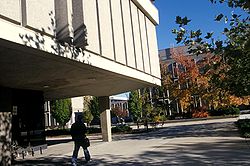
Libraries
- John Cotton Dana Library
- Institute of Jazz Studies
- Rutgers Law Library – Newark
- Don M. Gottfredson Library of Criminal Justice
Student housing
Freshman students living on campus are assigned to Woodward Hall. These suite style accommodations are non-cooking and contain three double bedrooms, as well as a bathroom. The rooms and suites are fully furnished, and the building includes a 24-hour computer lab and laundry room.Returning and transfer students under the age of 21 are assigned to University Square while returning and transfer students who are at least 21 years old are assigned to Talbott Apartments. Both complexes offer single rooms in either a 3-person or 4-person shared apartment and include a computer lab, study/social lounges, television lounges, a laundry room, and vending area.
Attached to Woodward Hall is Stonsby Commons & Eatery for residents who are on a meal plan. While Woodward Hall residents are required to be on a meal plan, any student may purchase a meal plan and eat in all campus dining halls.
A limited number of family apartment options are available for married/domestic partners and students with children in university-owned brownstones.
Student media
The Observer is the independent, student-run newspaper of Rutgers University in Newark. Covering the Newark campus and surrounding University Heights community since 1936, the newspaper publishes every Tuesday morning during the fall and spring semesters.WRNU radio station is located in the Paul Robeson Campus Center. It offers a variety of diverse musical and talk-show programs and can be enjoyed by residents in student housing on radio dial 103.9 FM.
The Newark Metro, a multimedia web magazine, covers metropolitan life from Newark and North Jersey to New York City. It is produced by students at Rutgers University in Newark, under the direction of Professor Robert W. Snyder.
Transportation services
- NJ Transit - Train
- NJ Transit - Bus
- PATH trains
- New York City Subway
- NY Waterway Ferry Service
- Newark Light Rail
- Newark Liberty Airport
- Amtrak
- University and CHEN Shuttle service
Safety and security
Rutgers University in Newark maintains a comprehensive safety program to promote a crime-free campus environment. Residence halls operate on electronic lock systems requiring card access 24 hours a day or are staffed 24 hours a day by security guards. Security cameras in residence halls, parking lots, and in other locations act as a deterrent to criminal behavior and serve as an investigative tool. Commissioned police officers supported by other trained personnel patrol regularly.Each year, the Division of Public Safety conducts workshops for students at orientation, in residence halls, and through “RU Safe” events, which are broadcast over the Rutgers television network. More detailed information on safety procedures is available through the Safety Matters newsletter published annually.
Points of interest
- The Newark Museum
- New Jersey Performing Arts Center
- Prudential Center
- Bears & Eagles Riverfront Stadium
- Branch Brook Park
- Weequahic Park Golf Course
- New Jersey Historical Society
- Newark Public Library
- Newark Symphony Hall
- WBGO Jazz Radio Station
See also
- Colonial collegesColonial collegesThe Colonial Colleges are nine institutions of higher education chartered in the American Colonies before the United States of America became a sovereign nation after the American Revolution. These nine have long been considered together, notably in the survey of their origins in the 1907 The...
- Henry RutgersHenry RutgersHenry Rutgers was a United States Revolutionary War hero and philanthropist from New York City, New York.-Biography:...
- List of notable Rutgers University people
- Public IvyPublic IvyPublic Ivy is a term coined by Richard Moll in his 1985 book Public Ivies: A Guide to America's best public undergraduate colleges and universities to refer to universities which "provide an Ivy League collegiate experience at a public school price." Public Ivies are considered, according to the...
- Rutgers UniversityRutgers UniversityRutgers, The State University of New Jersey , is the largest institution for higher education in New Jersey, United States. It was originally chartered as Queen's College in 1766. It is the eighth-oldest college in the United States and one of the nine Colonial colleges founded before the American...
- Rutgers-New BrunswickRutgers-New BrunswickRutgers–New Brunswick is the largest campus of Rutgers University . It is chiefly located in the City of New Brunswick and Piscataway Township...
- Rutgers-CamdenRutgers-CamdenRutgers University in Camden, New Jersey, USA , is a state-funded, coeducational, public, research university. Founded in the 1920s, Rutgers–Camden began as an amalgam of the South Jersey Law School and the College of South Jersey. It is the southernmost of the three regional campuses of Rutgers,...
- Rutgers Business School-Newark and New BrunswickRutgers Business SchoolRutgers Business School is the graduate and undergraduate business school tied to the Newark and New Brunswick campuses of Rutgers University. It was founded in 1929.Rutgers Business School offers bachelor, masters, and Ph.D. degrees...
(graduate and undergraduate) - Rutgers School of Business - CamdenRutgers School of Business - CamdenThe Rutgers School of Business in Camden teaches accounting, management, organizational behavior, marketing, and related arts of the business world in Camden, New Jersey, United States, not too far from Adventure Aquarium, the River Line and the Benjamin Franklin Bridge.-See also:*List of United...
- Rutgers School of Law-Camden
- Rutgers School of Law—NewarkRutgers School of Law—NewarkRutgers School of Law–Newark is the oldest of three law schools in the U.S. state of New Jersey. It is located at the S.I. Newhouse Center for Law and Justice, at 123 Washington Street, in downtown Newark...
- Post-secondary education in New JerseyPost-secondary education in New JerseyA large number of post-secondary education options are available in the State of New Jersey. Currently, 31 four-year colleges and universities are located in New Jersey...
- List of American state universities

